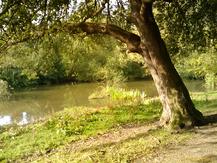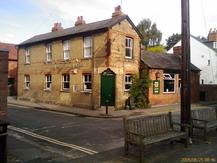2010: Scrapbook continues as http://www.justthoughtsnstuff.com
Landscapes 19th August 2009
A couple of weeks ago I was early for a meeting and got off the bus at Botley, walked down the Willow Walk, turned along the overgrown bank of a stream, crossed a bridge and climbed a gate into a magical stretch of countryside sandwiched between the ring road and the railway line. The meeting was on Osney Mead industrial estate and I did a big loop: up through the meadows almost as far as South Hinksey, through a gap in a hedge, across first a vast college sports ground then the railway line before heading for Grandpont nature reserve and the Thames path.
I hadn’t walked these fields and tracks for eight years but only took one wrong turn. The countryside was pretty much as I remembered, only gates and fences had changed – a couple of gates removed either side of a bridge over one of the many streams that meander across the land; a fence fallen down along the edge of the sports ground.
I found the journey I made that morning both beautiful and unsettling. Memories tumbled through my head. I was astonished at how much pain from those sad days came back but also pleased that I seemed to be able to think about my younger self objectively. The past seemed to be in some sort of proportion. Even so, when I’ve walked through old haunts since that morning, I’ve again thought about the past and taken some photos of places that meant so much to me then, which you can see below. (The buses at this time of year are quick and there’s usually a chance of an hour’s walk before work.)
What caused the pain?
A little over 13 years ago I walked into a lawyer's offices and started an odd journey. At the risk of bathos, I don't think of it as a big Odyssian journey, more as a journey made by canoe. I choose the image of the canoe because there were many times over the coming years when I felt vulnerable and lost in a vast endless sea. All I could do was paddle steadily and hope I was going in the right direction.
But in case I’m accused of falsifying my journey like some dodgy TV survival expert, I should confess that there was a support vessel for some of the time. For some of the time I climbed out of the canoe, up the rope ladder and went to a cabin and shut myself off from my sadness. I wrote The Lock in between the times when I was coming across pieces of flotsam and jetsam, struggling to make sense of what I was learning, and the writing soothed me. Sometimes it took me out of myself completely, at other times I was able to work through some of the themes from real life in the fiction.
And all this time, over the years before I reached land and felt I knew enough to take the best decision I could manage under the circumstances and bring the whole sorry, wretched business to the best conclusion one could hope for, I walked along the paths and rabbit runs along the Thames and Cherwell. Took comfort from the snatches of natural world that make Oxford such a special city.
There was just one time when I thought that the pain was going to be too great for even writing and nature to heal: the first two or three months after the initial discovery. That period turned the past inside out, made sad, misguided people of those I had looked up to. That revealed management decisions that were pointless and utterly avoidable. Before then, I had begun to suspect that I would never end up as the farmer I hoped to be. What I learned confirmed this and I had to start a new life.
I had begun writing The Lock before I went to the lawyer’s offices and was starting, as life’s ironic side would have it, Chapter 6 when I made the first discovery. That chapter, about a mother's worst fears for her wayward daughter, was in any case going to be nightmarish, verging on the insane. As I wrote it first, the luridness of the imagery and the seasick-making shifts of perspective and tense reflected the sense I had of all the guy ropes tethering me to the ground being cut away, one after the other. Readers still find it an odd chapter, even after it has been extensively revised, tamed. I left it in as a reminder of that time.
So, here are the pictures – which I shall add to if I pass by other places that helped me over the coming weeks. (Just cameraphone snaps.)
|
 |
| Rainbow Bridge Meadows |
|
|
 |
| Thames and Twenty Pound Meadow |
|
|
 |
| Cottage opposite Port Meadow |
|
|
 |
| Cattle on Port Meadow |
|
|
 |
| The Grebe Pool |
|
|
 |
| Bridge leading to Willow Walk |
|
|
 |
| Stream by Osney substation 1 |
|
|
 |
| Stream by Osney substation 2 |
|
|
 |
| City gives way to countryside |
|
|
 |
| Grandpont nature reserve |
|
|
 |
| Hand, Grandpont |
|
|
 |
| Waterman's Arms, Osney (Narrowboat in The Lock) 1 |
|
|
 |
| Waterman's Arms, Osney (Narrowboat in The Lock) 2 |
|
|
 |
| East Street, Osney |
|
|
|
Stanley Middleton 30th July 2009
Sad to hear of the death of Stanley Middleton, who I first came across in a gem of a book called The Novel Today: a critical guide to the British novel, 1970-1989 by Allan Massie (Longman in association with the British Council, 1990 -- probably quite difficult to find but a very insightful book about the generation of novelists that is now at the top of the literary tree). He was a wonderfully understated writer. The following is an unpublished review I did for the Times in 2006 that got nudged out by some breaking news or other.
MOTHER'S BOY by Stanley Middleton - Hutchinson, £18.99; 247pp
Stanley Middleton's 43rd novel is about a young couple's attempt to save their marriage under the shadow of the husband's formidable mother. As is usual in Middleton's fiction, the characters deal with their problems in ways that are realistic in their ordinariness. It is the artful storytelling that reveals the surprising complexities beneath the surface.
London professionals, John and Helen Riley (an accountant and a solicitor respectively), have been separated for several months. While their relationship was founded on strong sexual attraction, it degenerated to such an extent "that every small disagreement became a major quarrel". The underlying cause of their predicament was their tendency to "put work before the other's convenience".
When John returns to the East Midlands at Christmas, his mother Ella (a junior school head teacher) tells him to repair his marriage. She overrules objections with reprimands like, "You young folks, you don't persevere."
Back in London, he invites Helen for a meal and over the coming months they go to concerts and spend a weekend in Stratford. They also stay with Ella and visit John's father who is in a nursing home suffering from dementia. They begin to re-establish their relationship, although there are setbacks. At a legal conference, Helen contemplates an affair with a brilliant young barrister. In the early summer she and John go to Florence on a make-or-break "second honeymoon".
One of the major themes of the novel is Ella's domination of her family and how this has damaged John emotionally – both by making him dependent and by setting him against her. His lack of empathy is the most notable consequence. But, as the story progresses, we are encouraged to revise our view of the mother-son dynamic. The perspective changes when Helen develops a strong friendship with Ella, and when Ella opens up to John after the pressures of his father's illness and her work get too much.
Middleton's purpose is not to belittle either the mother or the boy but to reveal what is valuable in their difficult relationship and to extol virtues that he traces back to the "Puritan ethic". In doing so, his experience as a writer enables him to avoid dourness and the accusation of perpetrating a novelistic sleight of hand. On the contrary, this gentle book builds without apparent effort to a convincing and moving conclusion.
Keble English Dinner Saturday 25th July 2009
Fabulous evening. Speaker quoted Nietzsche on close reading (rather marvellous, I thought, because it seemed to sum up so much that I hold dear, so I looked it up on Web):
'For philology is that venerable art which exacts from its followers one thing above all — to step to one side, to leave themselves spare moments, to grow silent, to become slow — the leisurely art of the goldsmith applied to language: an art which must carry out slow, fine work, and attains nothing if not lento. Thus philology is now more desirable than ever before; thus it is the highest attraction and incitement in an age of 'work': that is, of haste, of unseemly and immoderate hurry-skurry, which is so eager to 'get things done' at once, even every book, whether old or new. Philology itself, perhaps, will not so hurriedly 'get things done.' It teaches how to read well, that is, slowly, profoundly, attentively, prudently, with inner thoughts, with the mental doors ajar, with delicate fingers and eyes.'
|
|